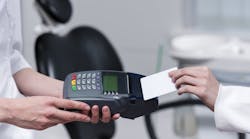Credit card spending has more than tripled in the last decade. For merchants accepting credit cards, that means billions of dollars in processing fees. While processing may be big money, very few people understand the ins and outs of this unregulated industry.
Dental offices face even more issues than a typical merchant, including the high cost of accepting virtual credit card payments, software integration challenges, and the collection of sensitive patient data, which makes them prime targets for increased fees and security breaches. Here are some insights on how to protect your practice and reduce costs.
Virtual credit card payments from insurance companies
If you receive payments from insurance companies that use virtual credit cards, you should investigate how to optimize these payments, as virtual payments normally come with extremely high processing fees. These fees are so high, in fact, that many states have banned insurance companies from only offering this payment option. The good news is that with the proper education on procedures you can reduce these drastically. You can read more specifics about existing virtual credit card legislation, including whether your state is on the list, on the American Dental Association’s website.
Software integration issues
Many of our dental clients use practice management software. Typically, these software companies work exclusively with one processor, which can make it challenging for a practice to secure optimal rates on their own.
Another major issue can involve the software itself. If you aren’t running the most recent upgrade, it may not share all the information required by the processor, resulting in additional charges that can really add up. While we would recommend calling your provider to ensure you’re running the most recent version, they aren’t always aware if there’s a problem or how to fix it. Merchant Advocate has extensive experience in this area and understands not only what information the processor needs to avoid fees, but can also ensure pricing is fair.
Unclear guidelines around surcharges
Some business owners have turned to cash discounts and surcharges to cover increases in processing costs, passing the cost to their customers. The guidelines and laws surrounding these programs are unclear, ever-changing, and vary by state and area. Many states cap the percentage of a transaction merchants can charge and the surcharge itself is often set up incorrectly, leading to math errors and overcharging. There are serious tax implications and the possibility of fines in these cases. Options include:
Sign up for a registered surcharge program that only passes the fee on credit cards. If you take insurance, you will need to check with your carriers to make sure it doesn’t break the contract with the set fee you have.
Raise your prices, offer a cash discount yourself (no need to have the processor involved as they are just trying to make a commission), and keep the extra profit. All you need to do this is a well-priced merchant account. You’ll need to become more familiar with monthly statements—particularly potential hidden or junk fees—and use these data points to negotiate lower fees. You can do this through more vigilant auditing or working with an expert who can help decipher these confusing statements.
Protecting your patient data
Every merchant that stores, processes, or transmits cardholder data is responsible for its protection. The Payment Card Industry (PCI) Data Security Standard (DSS) was created to help protect consumer data. Because patients’ credit card data is considered patient data, a PCI breach is also a HIPAA violation. The good news is that it’s easy to become compliant by using a PCI-compliant hosting provider. EMV chip cards are an additional way to protect card-present transactions.
To ensure PCI compliance, you must implement the proper security policies, procedures, and staff training. You can start by auditing your merchant statements, which will show noncompliance via a penalty fine. Other simple steps include changing your user account passwords on a regular basis, using a third party to monitor your network security, and reviewing your physical security measures such as employee training and IT infrastructure.
Protect your interests and your patients
Third-party auditors are often the best resources for understanding the credit card processing ecosystem, as processors often hide fees and make calculation errors in needlessly confusing monthly statements. It’s also normal for them to raise rates three to four times per year. Without due diligence and knowing how to read these statements, fees add up quickly.
The ever-evolving landscape of credit card security and compliance underscores the need for constant vigilance to safeguard both your financial interests and patient data. Increasing awareness leads to savings and less stress down the line and empowers dental offices to navigate the credit card payment ecosystem with greater confidence.
A veteran of the finance industry, Eric Cohen founded Merchant Advocate in 2007 to act as a trusted advisor on behalf of all sizes and categories of businesses. He was determined to create a fair value proposition and transparency for merchants with their credit card processors. His vision has driven the development of an entirely new industry of advocacy in merchant services. Eric lives in New Jersey with his family.





